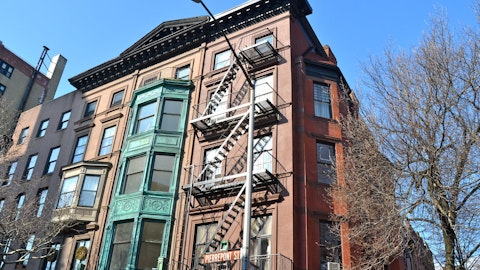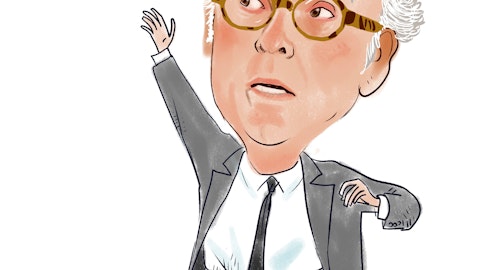That was that was unlevered. But sort of post, now the modification that loan, that loan is a loan that we can finance on any number of facilities. But I would say that, the conversations have been constructive. And we have an opportunity to kind of work through and get runway where needed.
Stephen Laws: Great. Appreciate the comments this morning, Patrick.
Patrick Mattson: Thank you, Stephen.
Operator: Our next question comes from Jade Rahmani of KBW. Please go ahead.
Jade Rahmani: Thank you very much. I wanted to ask, in terms of your quarterly interest income, do you know what percentage of that is funded out of interest reserves that are structured upfront as part of the loans?
Matt Salem: Hey, Jade, this is Matt. I can jump in there. I don’t have that number right in front of me right now. It’s not abnormal, obviously, for us to have reserves or recourse obligations to new guarantees to fund interest payments, just given the nature of the business plan and lease up, et cetera, but don’t have the exact number in front of me.
Jade Rahmani: Okay. But is that an issue in terms of any shortfall and performance and pressure from elevated interest rates, the exhausting of those reserves in coming quarters?
Matt Salem: I mean, what’s it comes back down to value at the end of the day. So, you look at most of our portfolio is in these growth sectors, and the value there has held up well and the fundamentals are really strong. So, I kind of put this in the same bucket as interest rate cap discussions as those expire, there’s a lot of value behind these loans and the sponsors re-up and come out of pocket and buy the next interest rate cap. So, lots of times our reserves are set to accommodate for interest at the cap, et cetera. But to the extent they’re not, I wouldn’t expect a lot of pressure there. I would just expect the sponsors to re-up on the reserve.
Jade Rahmani: Thank you very much. On the multifamily credit outlook, it was somewhat surprising to see the downgrade on the West Hollywood asset. I was wondering if you could talk to your overall expectations for that sector? It’s definitely been a resilient sector in past cycles. However, the early 90s did see credit issues. And CMBS throughout time has always had credit issues in multifamily. This time around we do have a record level of units under construction, disproportionately concentrated in the growth markets. And then a lot of deals done at very low cap rates, which would have pressure from valuation as well as interest rate caps. So what would be your outlook in terms of multifamily credit performance?
Matt Salem: Yes. I think we’re still, I think very favorable outlook on multifamily credit performance. Clearly values have come down a little bit too, and cap rates have increased just to accommodate the higher cost of capital and the current interest rate environment. On the on the occupancy side, the properties or the markets still operating it at basically all time highs. And we’re still seeing pretty favorable rent growth. Although it’s come down a fair amount, as you — as we reported, just on this call, we’ve got about — in just in our KREF portfolio, rents were up on a same-store sales basis, 12%, year-over-year from fourth quarter of 2022 to 2021, from 2021 to 2022, excuse me. So, and I expect that to continue to come down, and my guess is across a broader set of assets, that’s probably in the high single-digits today, by the way, which I still think is very, very healthy and is kind of the Fed is activity is obviously having some impact on that, which is probably a net positive for the whole market.





